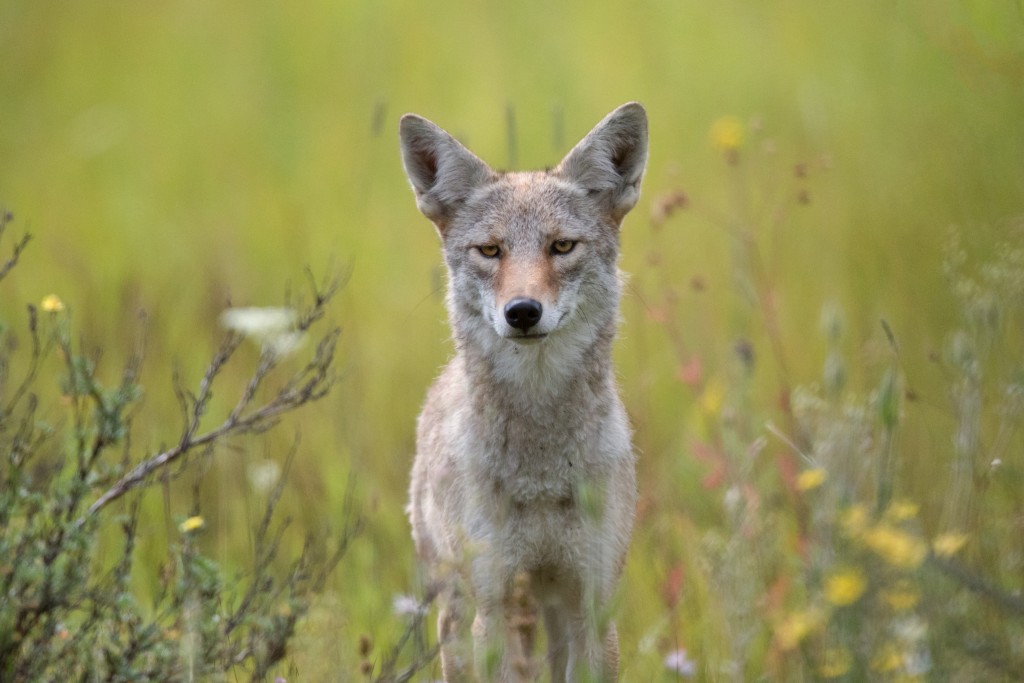Legal Victory Guarantees Analysis of Wildlife Services’ Killings in Wyoming
For Immediate Release, August 12, 2019
| Contact: |
Andrea Santarsiere, Center for Biological Diversity, (303) 854-7748, asantarsiere@biologicaldiversity.org |
Court OKs Ban on Wildlife Cyanide Poisoning Across 10 Million Acres of Wyoming
Legal Victory Guarantees Analysis of Wildlife Services’ Killings in Wyoming
CHEYENNE, Wyo.— A federal wildlife-killing program will be banned from using deadly M-44s — spring-loaded capsules armed with cyanide spray — across more than 10 million acres of public land in Wyoming. The ban is as part of an agreement resulting from a lawsuit brought by wildlife advocacy groups.
A Cheyenne federal court has approved the agreement, which also requires the U.S. Department of Agriculture’s Wildlife Services to analyze the environmental impacts of its killing of coyotes, bobcats and other wildlife in Wyoming. New trapping restrictions will also be put in place, as will additional protections for grizzly bears.
“This is a major victory for Wyoming wildlife, especially those that have been perpetually targeted in this horrifically destructive war on animals,” said Andrea Santarsiere, a Center attorney representing the conservation groups involved in the lawsuit. “These deadly cyanide weapons should be banned everywhere.”
Under the new court order, Wildlife Services must provide, by Jan. 8, 2021, an environmental analysis of the effects and risks of its wildlife-killing program in Wyoming. In 2018 Wildlife Services killed 6,231 coyotes, 51 wolves, 148 foxes, and thousands of other creatures in Wyoming.
Pending completion of the analysis, the court order imposes several measures to protect Wyoming’s wildlife. It bans the use of M-44 cyanide devices, den fumigants and lead ammunition on all National Park Service lands, U.S. Forest Service lands, Wilderness Areas and Wilderness Study Areas.
In addition, numerous restrictions aimed at reducing nontarget wildlife deaths now apply statewide. Wildlife Services cannot use neck snares lacking breakaway features to release heavier nontarget animals or Conibear body-gripping style traps that kill trapped animals and thereby prevent release of nontarget species. And foothold traps must have offset or padded jaws to reduce suffering and injury of trapped animals.
Several additional measures aim to prevent Wildlife Services from inadvertently harming endangered grizzly bears, including restrictions on use of neck snares and traps where grizzly bears live.
“It’s past time for the government to stop killing predators for the sake of the livestock industry,” said Erik Molvar, executive director of Western Watersheds Project. “While the settlement is a temporary reprieve for native wildlife, we hope that taking a hard look at the program will reveal the ineffective and dangerous aspects of these activities, resulting in permanent protections.”
“Wild animals in Wyoming can breathe a sigh of relief,” said Taylor Jones of WildEarth Guardians. “This ruling will make our public lands much safer for wildlife, humans and companion animals.”
The victory announced today is the result of a lawsuit filed in January by the Center for Biological Diversity, Western Watersheds Project and WildEarth Guardians.
Background
Wildlife Services is a multimillion-dollar federal program that uses painful leghold traps, strangulation snares, poisons and aerial gunning to kill wolves, coyotes, cougars, birds and other wild animals. Most of the killing responds to requests from the agriculture industry.
The program reported killing nearly 1.5 million native animals nationwide in 2018. Nontarget animals, including pets and protected wildlife like wolves, grizzlies and eagles, are also at risk from the program’s indiscriminate methods. In 2017 two family dogs died near Casper, Wyo., after encountering M-44 “cyanide bombs,” often used by Wildlife Services.
Today’s victory follows several other recent wins by wildlife advocates in their campaigns against Wildlife Services, including in California (2019 and 2017), Oregon (2018), Colorado (2017), Arizona (2017) and Idaho (2019 and 2018).
Photo: Wyoming coyote, courtesy of G. Scully, Wyoming.
The Center for Biological Diversity is a national, nonprofit conservation organization with more than 1.4 million members and online activists dedicated to the protection of endangered species and wild places.
Western Watersheds Project is an environmental conservation group working to protect and restore western watersheds and wildlife.
WildEarth Guardians works to protect and restore the wildlife, wild places, wild rivers and health of the American West.



